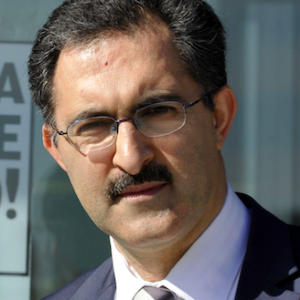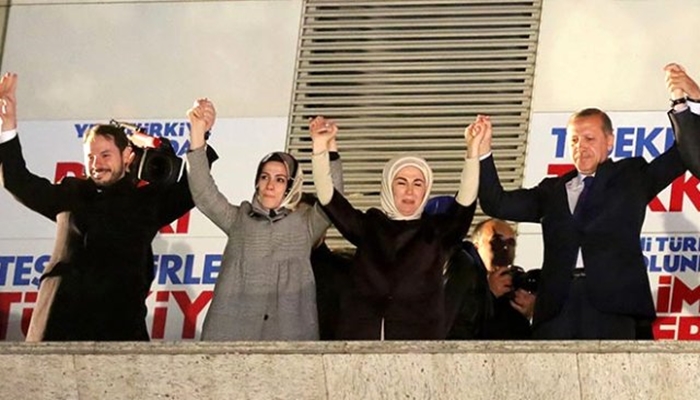By Abdullah Bozkurt
The keystone in the massive dragnet set up by the corrupt president, Recep Tayyip Erdoğan, to rob the nation’s wealth is Prime Minister Binali Yıldırım, who has masterfully excelled over two decades in pillaging state coffers ever since he started to work with Erdoğan when the latter was the mayor of Istanbul, Turkey’s largest city.

Yıldırım reportedly ran the secret stash of cash on the sidelines as Erdoğan ruled Istanbul between 1994 and1998, receiving kickbacks from major development projects for the city. In fact, that parallel accounting system was the major feud between Erdoğan and his political master, Necmettin Erbakan, who was the founding father of political Islam in Turkey. According to the setup in this Islamist mafia-type organized crime syndicate, Erdoğan was supposed to send this stash to Erbakan’s party headquarters but instead kept some, creating a major rift within the now-defunct Welfare Party.
When Erdoğan parted ways with Erbakan — who was ousted from power by the generals and faced prosecution on financial irregularities — to establish his own political party, the Justice and Development Party (AKP), in 2001, it was Erdoğan who had the financial means to bankroll this new party, which was swept into power a year later. Yildirim was one of the longest-serving ministers in the Erdoğan government, running the multi-billion-dollar portfolio of the Ministry of Transportation, Communication and Maritime Affairs until 2013. Erdoğan trusted him with the wealthiest ministry and the responsibility of allocating huge infrastructure development projects, from road construction to building railroads and airports. Yildirim’s job description was again to get a commission for Erdoğan from these projects when they were awarded to cronies. Even when a major train derailment in July 2004 in Sakarya province resulted in the deaths of 41 people, Erdoğan stood by Yildirim, who faced enormous public pressure to resign.
The huge corruption investigations of December 2013 exposed how Yıldırım was deeply entrenched in kickbacks as well as the pooling of funds from pro-Erdoğan businesspeople who were asked to contribute to finance the takeover of a media group in exchange for lucrative contracts from the government. When the police started rounding up the sons of corrupt ministers at the order of prosecutors, Yıldırım also panicked as his son, a gambling addict, was reportedly sought for arrest. On the morning of sweeping arrests that rattled the government, he called a colleague of mine in Ankara to ask about whether he or his family members were cited among those who were being investigated.
He was right. An investigation file about Yıldırım exposed how he collected $630 million to hand over a media outlet that, among others, owned the Sabah daily and the ATV network. In return, pro-Erdoğan cronies were awarded contracts and tenders valued at $87,832,000,000. Other investigations, especially ones that looked into tenders in the state-run railway company TCDD, uncovered major kickbacks and bribes. His brother-in-law, Cemalettin Haberdar, was arrested in 2013 on charges of taking bribes in port tenders and contracts in the western province İzmir. The video recordings leaked from the case file show him exchanging a bag of money while under surveillance.
All these investigations were thwarted by then-prime minister and now president Erdoğan, who sacked prosecutors, judges and police investigators en masse. In a vindictive policy, they were later arrested on trumped-up charges of terrorism and a coup attempt. Despite the fact that four ministers had to resign after the corruption exposé, Erdoğan kept Yildirim at his side, making him chief advisor even after a Cabinet reshuffling. In a daring move, Erdoğan later nominated him to run in a mayoral race in the western province of İzmir, where his name was involved in corrupt contracts and tenders. He lost the race but came out a winner when he was again made minister of transportation despite the objection of then-Prime Minister Ahmet Davutoğlu. Nobody knows how much Yıldırım is worth or the size of his family’s wealth, which reportedly includes control of some 17 companies, close to 30 freighters and other assets. Most are in caretaker hands to make it difficult to trace. That is why Yıldırım did not respond to a series of parliamentary questions that were asked by lawmakers about his assets.
Erdoğan brought Yıldırım to the prime minister’s position in a political coup right after Davutoğlu won the national elections in a landslide in November 2015. I suppose he did not trust Davutoğlu enough to run the corrupt governance system and always suspected that the ambitious academic-turned-politician Davutoğlu might set up his own corrupt shop to challenge his. On the other hand Yıldırım, who has proven to be a loyalist for a span of more than two decades, was a perfect candidate for Erdoğan, who wanted to exercise unconstitutional powers through a pawn he could totally control. Both of these two men’s fates are intertwined, meaning that if Erdoğan goes down, so does Yıldırım. They have a mutual interest in running this crooked system in Turkey at any cost.
Another key operative in Erdoğan’s inner circle who has significant influence in financial and economic policy decision-making is Yiğit Bulut, a flamboyant alcoholic who was saved by Erdoğan from a hit-and-run accident. He is known as the “telekinesis man” because of his remarks in 2013, when he claimed dark forces were trying to murder his boss, Erdoğan, by launching a gigantic telekinetic attack. Among the far-fetched claims he made publicly were a prediction of doomsday scenarios for the dismemberment of the US and the EU, the rise of China and Russia, the resurrecting of the Ottoman Empire and chasing the International Monetary Fund (IMF) and the World Bank out of Turkey.
Despite this public charade and contrary to what many believe in financial circles, Bulut is a clever guy who reads Erdoğan better than anybody else. He deliberately stokes fears and animosity long harbored by Erdoğan and other Islamists in Turkey against the West. He triggers anti-Semitic sentiment in the minds of Turkey’s Islamist rulers, which used to be latent but are no longer, by constantly raising conspiracies about global financial predators, IMF-bashing, EU-slamming and more. With these tactics, Bulut curried favor with Erdoğan, helped former economy czar Ali Babacan and others to be sidelined and positioned key loyalists in the economic management of Turkey.
The leaked Albayrak emails show Bulut works closely with Erdoğan family members. The secret proposals he made to Erdoğan’s son-in-law were put into action and turned into policy decisions. He set up a parallel economic management team in the presidential office when the responsibility of running the economy is actually in the hands of the government according to the Turkish Constitution. In an email sent to Albayrak on Nov. 1, 2014, Bulut laid out how he envisioned this structure in the president’s office, from running secret financial operations to intelligence gathering to profiling businesspeople in Turkey. He also suggested setting up a sovereign fund to be controlled by Erdoğan to confront what he predicted to be impending financial attacks. In another note titled ‘Findings’ he sent to Albayrak on the same day, Bulut claimed the Western capitalist system was trying to thwart Turkey’s project of integration between the Capisan and northern Iraq hydrocarbon potentials. He later suggested using military power to increase the leverage. It is clear that by using Erdoğan’s clout and power, Bulut was able to push policy actions through the government, helping formulate draft bills in Parliament.
Only through these key loyalists has Erdoğan been able to sustain his campaign of robbing the wealth of Turkey and reshaping Turkish trade and economic policies to cater to his own constituency and at times even adopting an irredentist approach to blackmail foreign countries. Looking at this shadowy dragnet he cast quite widely, one can understand why Erdoğan and his vultures are terrified of the scrutiny of the light of day. They stand to lose from the transparency and accountability of a democratic government.


